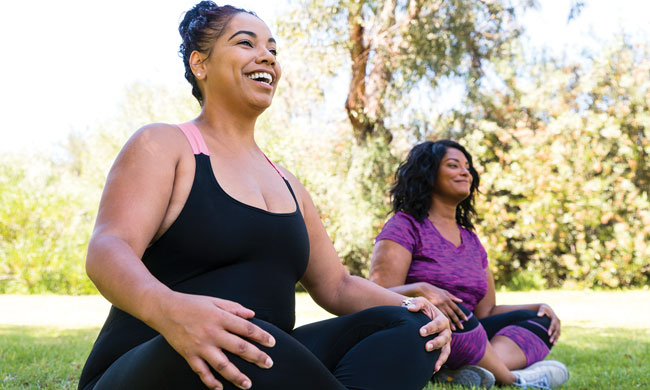HEALTHY LIVING
Explore the importance of mental wellness for healthy heart, brain

(Family Features) Research shows anxiety, stress and depression can have a negative impact on physical health and may even increase the risk for heart disease and stroke.
In fact, the American Heart Association, the world’s leading nonprofit organization focused on heart and brain health, identified a strong interconnection between the mind, heart and body in its scientific statement, “Psychological Health, Well-Being and the Mind-Heart-Body Connection.”
“Research has clearly demonstrated negative psychological factors, personality traits and mental health disorders can negatively impact cardiovascular health,” said volunteer chair of the statement writing committee Glenn N. Levine, M.D., FAHA, master clinician and professor of medicine at Baylor College of Medicine and chief of the cardiology section at the Michael E. DeBakey VA Medical Center. “The body’s biological reaction to stress, anxiety and other types of poor mental health can manifest physically through an irregular heart rate or rhythm, increased blood pressure and inflammation throughout the body. Negative psychological health is also associated with health behaviors that are linked to an increased risk for heart disease and stroke, such as smoking, lower levels of physical activity, unhealthy diet, being overweight and not taking medications as prescribed.”
Studies have found some people, including people of color, may face a greater risk of poor health outcomes due to chronic stress, depression and anxiety linked to psychosocial stressors, particularly those related to social and economic inequality, discrimination, systemic racism and other societal factors. A study published in the “Journal of the American Heart Association” found U.S. adults who reported feeling highly discriminated against at work had an increased risk of developing high blood pressure compared to those who reported low discrimination at work.
“Mental health includes our emotional, psychological and social well-being,” Levine said. “It affects how we think, feel and act. It also helps determine how we handle stress, relate to others and make choices. Practicing mindfulness in all forms allows one to be more aware of and have more control over emotional responses to the experiences of daily life.”
Consider these tips from Levine to improve your mind-heart-body connection:
- Practice meditation regularly. Even simple actions such as communing with nature or sitting quietly and focusing on your breath can have a positive impact.
- Get plenty of good, restful sleep. Set a regular bedtime, turn off or dim electronics as bedtime approaches and form a wakeup routine.
- Make connections and stay in touch. Reach out and connect regularly with family and friends, or engage in activities to meet new people.
- Practice mindful movement. There are many types of gentle mindful practices like yoga and Tai chi that can be done about anywhere with no special equipment to help ease your soul and muscles.
- Spend time with your furry friend. Companion animals are often beloved members of the family and research shows pets may help reduce physiological reactions to stress as well as support improved physical activity.
- Work it out. Regular physical activity – a recommended 150 minutes of moderate activity, 75 minutes of vigorous activity or a mix of both weekly – can help relieve tension, anxiety and depression, and give you an immediate exercise “high.”
“Wellness is more than simply the absence of disease,” Levine said. “It is an active process directed toward a healthier, happier and more fulfilling life. When we strive to reduce negative aspects of psychological health, we are promoting an overall positive and healthy state of being.”
Learn more about the importance of heart health at heart.org.
Photo courtesy of Getty Images
SOURCE:
American Heart Association
HEALTHY LIVING
5 travel tips for people with diabetes

(Family Features) Be it a short weekend trip to an epic destination or a longer trip to a dream spot, 212 million American adults are planning much-deserved vacations, according to The Vacationer’s Summer Travel Survey 2024. However, one thing travelers living with type 1 diabetes can’t leave behind: their diabetes.
This is why many frequent travelers living with type 1 diabetes like Nicky Williams, a full-time student who loves documenting travel on her blog, are always prepared by having a checklist when she travels. This checklist helps those like Williams carefully manage type 1 diabetes and allows them to manage the unexpected.
“I was born with a sense of wanderlust,” Williams said. “However, 14 years ago, my ability to travel was challenged when I was diagnosed with type 1 diabetes. Thanks to my diabetes tech, my love for travel and my passion for trying different foods around the world is as strong as ever. When I travel, I’m less stressed‡ when enjoying new cultures and foods where I might not get the carb count just right. I let my MiniMed 780G system do what it does best and account for the unexpected so I can truly immerse myself in the experience instead of my diabetes.”
If you’re planning a trip this summer and looking for a better way to manage your diabetes, consider these tips:
Talk to Your Health Care Provider
Discuss your current treatment plan and any concerns you have. Talk about adjustments you may need to make, depending on where you’re going, what you’ll be doing and how your diet may be affected. Also be sure to get a current letter stating you have diabetes and any special information regarding your needs that you can provide in the event of an emergency.
Pack Your Supplies
Put your diabetes supplies in a carry-on bag and pack twice as much insulin as you think you’ll need. Consider packing insulin with a gel ice pack, which is less likely to get flagged by luggage scanners. With a solution like the Medtronic Extended infusion set, travelers with diabetes have the option for an extended wear duration of up to seven days, leaving more space for packing other items.
Navigate the Airport
Traveling with a medical device or supplies can be a nerve-wracking experience, especially if flying to your destination. Upon arriving at the security screening, notify security officers of any equipment in your carry-on or attached to your body. While you will not be required to remove an attached device, you may be subject to additional screenings, including a visual inspection, self-pat down and other trace testing of the device and supplies.
Research Pharmacies
Look into where you can access additional supplies if you run low, your luggage gets misplaced, or some other unforeseen event affects your insulin or other supplies. Verify whether the pharmacy accepts your insurance and the types of supplies you might need. You may even want to call ahead to get your information entered in their system so they’re able to help you more efficiently if an urgent need arises. If something happens to your insulin pump, know your options for getting a replacement or loaner while traveling.
Safeguard Your Routine
Mealtimes are consistently cited as one of the most difficult aspects of diabetes management and the change of pace that comes with travel and excursions can disrupt your routine. An automated insulin delivery system can help alleviate that stress for those times when you forget to plan ahead. An option such as the MiniMed 780G system has your back if you occasionally forget or miscalculate a dose.† The system’s world-class algorithm measures sugar levels every 5 minutes, assessing if a meal has been eaten and giving automatic corrections and adjustments to insulin. With some of the manual work being taken on by the system, traveling becomes a more seamless experience, allowing you to enjoy your favorite foods, relax and revel in your vacation.
To learn more about managing diabetes on the road, visit medtronicdiabetes.com/TravelTips.

‡ Refers to SmartGuard™ feature. Individual results may vary.
† Taking a bolus 15-20 minutes before a meal helps to keep blood sugar levels under control after eating.
Important safety information: MiniMed™ 780G system with SmartGuard™ technology with Guardian™ 4 sensor
The MiniMed™ 780G system is intended for continuous delivery of basal insulin at selectable rates, and the administration of insulin boluses at selectable amounts for the management of type 1 diabetes mellitus in persons seven years of age and older requiring insulin as well as for the continuous monitoring and trending of glucose levels in the fluid under the skin. The MiniMed™ 780G system includes SmartGuard™ technology, which can be programmed to automatically adjust insulin delivery based on the continuous glucose monitoring (CGM) sensor glucose values and can suspend delivery of insulin when the sensor glucose (SG) value falls below or is predicted to fall below predefined threshold values.
The Medtronic MiniMed™ 780G system consists of the following devices: MiniMed™ 780G insulin pump, the Guardian™ 4 transmitter, the Guardian™ 4 sensor, One-press serter, the Accu-Chek™ Guide Link blood glucose meter, and the Accu-Chek™ Guide test strips. The system requires a prescription from a healthcare professional.
The Guardian™ 4 sensor is intended for use with the MiniMed™ 780G system and the Guardian 4 transmitter to monitor glucose levels for the management of diabetes. The sensor is intended for single use and requires a prescription. The Guardian™ 4 sensor is indicated for up to seven days of continuous use.
The Guardian™ 4 sensor is not intended to be used directly to make therapy adjustments while the MiniMed™ 780G is operating in manual mode. All therapy adjustments in manual mode should be based on measurements obtained using a blood glucose meter and not on values provided by the Guardian™ 4 sensor. The Guardian™ 4 sensor has been studied and is approved for use in patients ages 7 years and older and in the arm insertion site only. Do not use the Guardian™ 4 sensor in the abdomen or other body sites including the buttocks, due to unknown or different performance that could result in hypoglycemia or hyperglycemia.
WARNING: Do not use the SmartGuard™ feature for people who require less than 8 units or more than 250 units of total daily insulin per day. A total daily dose of at least 8 units, but no more than 250 units, is required to operate in the SmartGuard™ feature.
WARNING: Do not use the MiniMed™ 780G system until appropriate training has been received from a healthcare professional. Training is essential to ensure the safe use of the MiniMed™ 780G system.
WARNING: Do not use SG values to make treatment decisions, including delivering a bolus, while the pump is in Manual Mode. When the SmartGuard™ feature is active and you are no longer in Manual Mode, the pump uses an SG value, when available, to calculate a bolus amount. However, if your symptoms do not match the SG value, use a BG meter to confirm the SG value. Failure to confirm glucose levels when your symptoms do not match the SG value can result in the infusion of too much or too little insulin, which may cause hypoglycemia or hyperglycemia.
Pump therapy is not recommended for people whose vision or hearing does not allow for the recognition of pump signals, alerts, or alarms. The safety of the MiniMed™ 780G system has not been studied in pregnant women, persons with type 2 diabetes, or in persons using other anti-hyperglycemic therapies that do not include insulin. For complete details of the system, including product and important safety information such as indications, contraindications, warnings and precautions associated with system and its components, please consult https://www.medtronicdiabetes.com/important-safety-information#minimed-780g and the appropriate user guide at https://www.medtronicdiabetes.com/download-library
Rx Only. Subcut admin of insulin only. NOT for IV or blood products. Infection/irritation risk possible. Follow directions and replace as indicated. See https://bit.ly/infusionsetsafety
Abbreviated+: Rx Only. Subcut admin of insulin only. NOT for IV or blood products. See https://bit.ly/infusionsetsafety
The content and all information provided is for your informational use only and is not intended to be a substitute for professional medical advice, diagnosis, or treatment in any manner. Responses to a treatment may vary from patient to patient. Always talk with your physician about diagnosis and treatment information and ensure that you understand and carefully follow that information.
SOURCE:
Medtronic
HEALTHY LIVING
Combat the epidemic of loneliness by eating together

(Family Features) According to the U.S. Surgeon General, Americans face a lack of social connection that poses a significant risk to individual health and longevity. “Loneliness and social isolation increase the risk for premature death by 26% and 29%, respectively. More broadly, lacking social connection can increase the risk for premature death as much as smoking up to 15 cigarettes a day,” per the report.
One way to address this epidemic of loneliness is by sharing a meal with friends and family. Learn five of the specific advantages of family meals identified by the Family Meals Movement and take advantage of these benefits during National Family Meals Month this September by sharing one more meal together each week.

Meals Together Foster Togetherness and Connectedness
Staying connected can be hard when schedules conflict and life gets busy, but shared meals with friends, family or however you define your family can be the glue that holds people together. Studies demonstrate a positive relationship between family meal frequency and measures of family functioning, which is defined as family connectedness, communication, expressiveness and problem-solving. The key is for family members to engage in conversation with one another during mealtimes and take advantage of the one-on-one time without distractions or interruptions from smartphones or other devices.
Meals Together Strengthen Mental Health
An often overlooked benefit of family meals is mental health support. Multiple studies show family meals have long been associated with improving mental health, including reducing symptoms of depression, decreasing violent behavior and lessening thoughts of suicide among youth. Among adolescents, frequent family meals can help mitigate the risks of destructive behaviors by boosting prosocial behaviors and life satisfaction. Data from the FMI Foundation’s “Staying Strong with Family Meals” Barometer shows family meals also help restore a sense of peace, with one-third of survey respondents saying family meals make them feel calm. In short, family meals are a recipe for strengthening emotional well-being among children and adolescents.
Meals Together Improve Nutrition
There is one easy way to help ensure your family is eating fruits and vegetables: a family meal. Research shows family meals improve fruit and vegetable consumption. It also pays to start this trend early, with research finding preschool-aged children who eat frequent family meals are more likely to eat more fruits and vegetables. Overall, researchindicates families who eat together frequently have a better overall healthy diet and lower body mass index.
Meals Together Improve Academic Performance
Helping students’ academic performance begins around the family dinner table. Eating more meals together as a family is associated with improved overall adolescent health, including higher grades. Multiple studies show students whose families eat together frequently perform better academically in areas such as reading and vocabulary. Research also supports a correlation between frequent family meals lowering incidents of risky and harmful behaviors, including drug and alcohol abuse, which may also contribute to school performance.
Meals Together Teach Civility
The family dinner table is a perfect place to show younger generations how to communicate respectfully, according to the Family Meals Barometer summary. In fact, 76% of survey participants agreed family meals are a good opportunity to have and teach respectful interactions while 70% said frequent family meals create a safe environment for families to discuss thornier societal issues. Another 68% affirmed their belief that sitting at a meal together tends to keep conversations more civil.
Learn more about the physical, mental and social benefits of family meals at familymealsmovement.org and follow #familymealsmonth and #familymealsmovement on social media.
Photo courtesy of Shutterstock
SOURCE:
FMI Foundation
HEALTHY LIVING
Everyday Ways to Nurture Your Skin This Summer: 4 simple habits to support healthy skin

(Family Features) Good skin care doesn’t have to mean intensive routines or expensive moisturizers – it can be as easy as adopting everyday habits that nurture your skin from the inside out. Keeping your skin healthy and glowing begins with protecting it from harmful ultraviolet (UV) rays and eating and drinking healthy foods and beverages.
With an important role in maintaining overall well-being, it’s reassuring to know skin health may be supported with healthy, everyday foods including fresh, juicy grapes. In fact, emerging research suggests consuming grapes may help protect healthy skin even when exposed to UV light, which is known to be damaging. A study published in the journal “Antioxidants,” in which people consumed 2 1/4 cups of grapes every day for two weeks, showed increased resistance to sunburn and reduced markers of UV damage at the cellular level.
This study reinforced previous and similar findings published in the “Journal of the American Academy of Dermatology.” Grapes are also a hydrating food with 82% water content; hydration is essential to healthy skin.
Consider these everyday ways you can protect your skin.
Keep the Sun at Bay
Protecting skin from the sun is crucial. A lifetime of sun exposure can lead to wrinkles, age spots and other health problems, including an increased risk of skin cancer. When you’re out enjoying some sunshine, generously apply sunscreen of at least 30 SPF every 1-2 hours. Covering skin with lightweight, long-sleeve shirts, wide-brimmed hats and other sun-protective clothing can also help block UV rays. Another heat-wave hack: Take to the shade during the hottest parts of the day, usually from 10 a.m. to 4 p.m., to avoid the sun’s rays when they’re at their strongest.
Fill Your Plate with Healthy Foods
Nutritious foods, including fruits and vegetables, can play an important role in achieving an overall balanced diet with adequate hydration. Enjoying the goodness of fresh or frozen Grapes from California can provide extra hydration and a boost of beneficial antioxidants and other polyphenols that help protect the health and function of the body’s cells, including those in the skin.
Stay Hydrated
Drink water throughout the day, and for added flavor, infuse with hydrating fruits like fresh, juicy grapes. For a cool, hydrating snack, try freezing grapes: simply rinse, pat dry, remove from the stems and freeze for 2 hours in a single layer on a sheet pan for flavorful ice cube replacements.
For an easy, refreshing way to add grapes to your menu and stay hydrated on warm days, try these Frozen Grape Lemonade Ice Pops for a sweet, delicious dessert the entire family can enjoy.
Fight Back Against Stress
Stress can negatively impact skin in a variety of ways, including making it more sensitive or reactive. Be mindful of the effects stress can have on your skin and practice stress-relieving techniques like getting enough sleep, exercise and perhaps exploring meditation, deep breathing or yoga.
Visit GrapesFromCalifornia.com for more delicious recipes and information on grapes and health.

Frozen Grape Lemonade Ice Pops
Yield: 8 ice pops
- 2 cups halved California Grapes
- 1 1/3 cups lemonade
- Fill eight 3-ounce ice pop molds with halved grapes.
- Pour in lemonade to just cover fruit. Insert ice pop stick handles.
- Freeze at least 3 hours until frozen.
-

 NEWS2 years ago
NEWS2 years ago2 hurt, 1 jailed after shooting incident north of Nocona
-

 NEWS8 months ago
NEWS8 months agoSuspect indicted, jailed in Tia Hutson murder
-

 NEWS1 year ago
NEWS1 year agoSO investigating possible murder/suicide
-

 NEWS2 years ago
NEWS2 years agoWreck takes the life of BHS teen, 16
-

 NEWS12 months ago
NEWS12 months agoMurder unsolved – 1 year later Tia Hutson’s family angry, frustrated with no arrest
-

 NEWS1 year ago
NEWS1 year agoSheriff’s office called out to infant’s death
-

 NEWS2 years ago
NEWS2 years agoBowie Police face three-hour standoff after possible domestic fight
-

 NEWS2 years ago
NEWS2 years agoDriver stopped by a man running into the street, robbed at knifepoint





